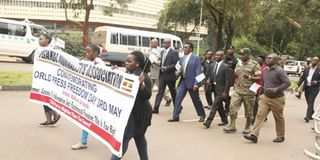Journalists root for self-regulation

Information and National Guidance minister Jim Muhwezi (3rdR, second row) leads journalists in a procession to mark the World Press Freedom Day in Kampala yesterday. Photo BY RACHEL MABALA
What you need to know:
View. Journalists noted that it is better to allow the media industry to regulate itself while government plays a supportive role.
Kampala. It is a tough call being in the media industry in Uganda today. You have to choose between being slammed by the government or to be shunned by the audience - readers, viewers and listeners. What would you rather do?
As the journalism fraternity convened yesterday to mark World Press Freedom Day, the discussions on the above scenarios took centre stage at a debate organised by the African Centre for Media Excellence (ACME) under the theme: “20 years of the Press and Journalist Act in Uganda: milestones, challenges and remedies”.
Journalists, media scholars, legal minds and human rights activists concurred that in light of the above situation, it is better to allow the industry adopt and enforce its own mechanisms of self-regulation with government only in a supporting role.
Issues
Makerere University’s journalism lecturer Adolf Mbaine in his paper presented at the debate said: “There is nothing objectionable about regulating the media, and, subsequently, the work of journalists. Indeed, it is a well settled argument in virtually every jurisdiction that media freedoms and the rights of journalists to do their job are not absolute, and must be enjoyed with due regard to the rights of other people and other collective interests like the security of the country.”
However, he added: “This latter position shifts considerably when it comes to regulating the work of journalists.”
But representatives of government led by Mr Kyetume Kasanga, from the Prime Minister’s information office, argued that self-regulation is only possible in an environment where the political-social terrain “has evolved”.
Unfortunately, Uganda is heading there slowly, which explains why government had to devise all means to regulate the media industry.
However, some of the means like the Uganda Communications (Amendment) Bill, 2016, which gives the executive arm of government outright powers to control communications in any way the sector minister deems fit, to several observers not only affects the media but the freedom of speech.
Then there was another school of thought that strongly argued for the development of a hybrid model that encompasses both self-censorship and state regulation.
But against backdrop of these discussions is a myriad of problems the media is facing, notably lack of solidarity, disintegrated media on the basis of alignment, lack of professionalism and increased interference, which the debate’s panellists agreed were also to blame for the state of the media in the country.
The [NRM] government passed the Press and Journalists Act in 1995 to regulate the media, which spells out several ways in which quality should be enforced but almost 20 years later since the legislation was passed, journalists agreed it is as good as useless.
For example, the Act calls for the establishment of the National Institute of Journalists of Uganda (NIJU) for training and ensuring journalists professionalism and the Media Council to enforce regulations.
But, Mr Mbaine argued that NIJU suffered “a natural death, after a couple of years trying to stand on its feet” which also affected composition of the council.
The newly-elected Uganda Law Society president, Mr Frank Gimara, described the legislation as “dead” and said it should be scrapped.
“It has only two useful sections, one that ensures quality of journalism and protection of sources, the rest are dead.”
The US deputy chief of mission, Ms Patricia Mahoney, speaking at the opening of the debate, also argued against state regulation saying: “If a country’s media is under threat, it means the citizens are under threat too.”




